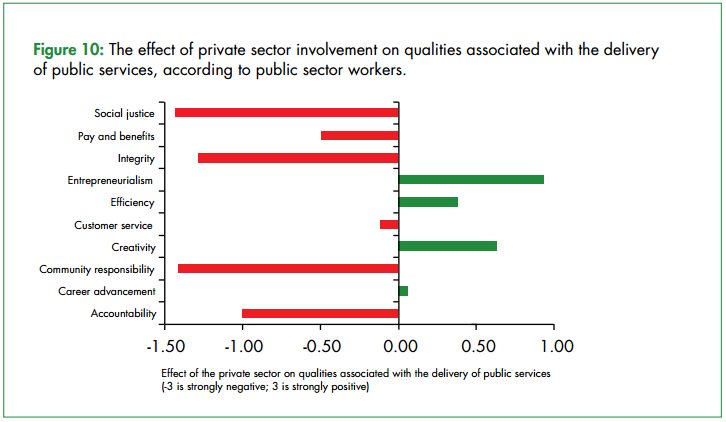Public servants think the private sector has corroded the public service ethos
Author: Dominic Leigh |

Public private collaboration is big business. Gone wrong it’s big news. In local government, the amount of total procurement spending going to third parties rose from £27.2 million (44 percent) in 2009/10 to £30.2 million (49 percent) in 2013-14. Beyond outsourcing, councils’ collaboration with the private sector is much broader, from appointing external auditors, lawyers, advisors and consultants, to facilitating inward investment and supporting local business growth, to working with banks and other private sector bodies in relation to investments and pensions. Similarly in the NHS, expenditure on private providers increased from 4.4 percent of total NHS spending in 2009-10 to 7.6 percent in 2015-16.

The survey we conducted of 1,415 senior managers and executives, as part of the research for our report A New Public Service Ethos, found public sector workers feel private sector involvement has led to a corrosion of the qualities associated with the public service ethos, including accountability, community responsibility, integrity, and – to a lesser extent – customer service.
Has the public noticed a decline in the quality of public services?
Yet according to the Institute of Customer Service’s UK Customer Satisfaction Index, public satisfaction remained remarkably stable during the Coalition Government despite increasing levels of outsourcing. Indeed, satisfaction with national public services increased by 2 percent between 2011 and 2016 and declined by 1.6 percent for local public services.
A similar effect is found for net satisfaction with the NHS, which was in negative figures before Labour came to power in 1997. Since then, a number of reforms have taken place, some of which have involved an increased role for the private. Over this time period, net satisfaction has increased markedly to as high as +50 percent in 2014.
Private sector involvement is, of course, not the only factor that affects public services or the perceived quality of those services, so it is difficult to determine cause and effect. Moreover, perceptions of the quality of public services are not the same as perceptions of the public service ethos. Nevertheless, if private sector involvement was having the corrosive effect on the accountability, community responsibility, customer service and integrity of public services, all nominally reputational values in that they require external validation, then one would expect there to be a noticeable decline on public perceptions of service quality.
The fact that there has not been a decline in public satisfaction suggests there is something more complicated than a mere decline in the public service ethos. Our report A New Public Service Ethos argues that the sense of corrosion or ‘loss’ that public sector workers feel is a result of private sector organisations being relatively successful at assimilating social justice values. We can also see this broad change in the wider economy, public opinion is sharpening against organisations who don’t treat their workers properly, or pay their taxes. Social justice is becoming a point of competitive advantage and our understanding of the role of the state in this competition is in its infancy.
